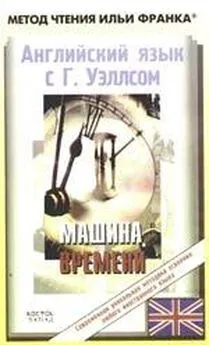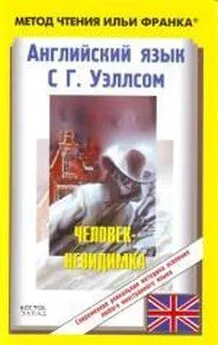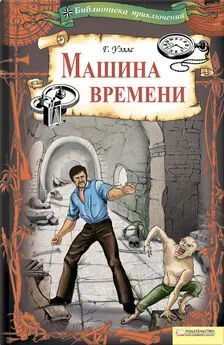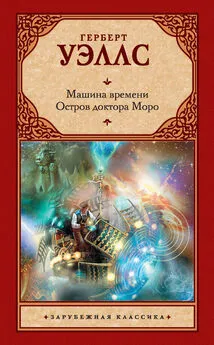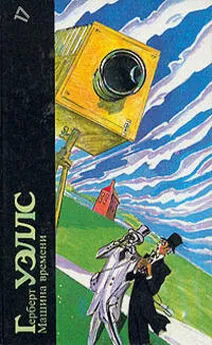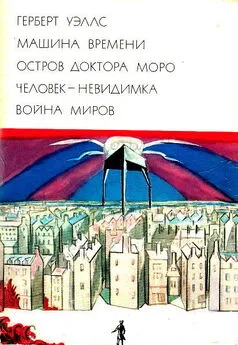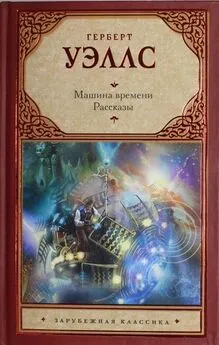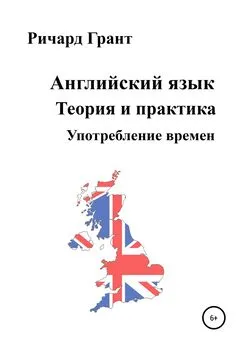H. Wells - Английский язык с Гербертом Уэллсом. Машина Времени
- Название:Английский язык с Гербертом Уэллсом. Машина Времени
- Автор:
- Жанр:
- Издательство:неизвестно
- Год:неизвестен
- ISBN:нет данных
- Рейтинг:
- Избранное:Добавить в избранное
-
Отзывы:
-
Ваша оценка:
H. Wells - Английский язык с Гербертом Уэллсом. Машина Времени краткое содержание
Английский язык с Гербертом Уэллсом. Машина Времени - читать онлайн бесплатно полную версию (весь текст целиком)
Интервал:
Закладка:
consequence [`kOnsIkwqns], ameliorating [q`mJlIqreItIN], climax [`klaImxks]
'It seemed to me that I had happened upon humanity upon the wane. The ruddy sunset set me thinking of the sunset of mankind. For the first time I began to realize an odd consequence of the social effort in which we are at present engaged. And yet, come to think, it is a logical consequence enough. Strength is the outcome of need; security sets a premium on feebleness. The work of ameliorating the conditions of life—the true civilizing process that makes life more and more secure—had gone steadily on to a climax. One triumph of a united humanity over Nature had followed another. Things that are now mere dreams had become projects deliberately put in hand and carried forward. And the harvest was what I saw!
'After all, the sanitation and the agriculture of to-day are still in the rudimentary stage (в конце концов охрана здоровья и земледелие в наши дни находятся еще в зачаточном состоянии; rudimentary — зачаточный, неразвитый, рудиментарный/лат./ ). The science of our time has attacked but a little department of the field of human disease (наука нашего времени = современнаянаука объявила войну лишь малой части человеческих болезней; department — отдел; составнаячасть/чего-либо/ ), but even so, it spreads its operations very steadily and persistently (но даже при этом она неизменно и упорно продолжает свою работу; to spread — распространять/ся/; steady — устойчивый; неизменный; persistent — настойчивый, упорный; стойкий ). Our agriculture and horticulture destroy a weed just here and there and cultivate perhaps a score or so of wholesome plants (земледельцы и садоводы: «наше земледелие и садоводство» уничтожают сорняки то здесь, то там и выращивают, возможно, десятка два полезных растений; to cultivate — культивировать, выращивать ), leaving the greater number to fight out a balance as they can (предоставляя остальным бороться /за свое существование/, как они умеют). We improve our favourite plants and animals (мы улучшаем наши любимые = избранныенами виды растений и животных)—and how few they are (и, заметьте, весьма немногие: «и как мало их»)—gradually by selective breeding (постепенно, путем избирательного выведения; to breed — высиживать/детенышей/; выводить, разводить/животных, растения/; gradually — исподволь, мало-помалу, понемногу, постепенно ); now a new and better peach (/мы выводим/ то новый, лучший /сорт/ персика), now a seedless grape (то виноград без косточек; seed — семя ), now a sweeter and larger flower (то более душистый и крупный цветок), now a more convenient breed of cattle (то более пригодную породу рогатого скота).
horticulture [`hLtIkAlCq], wholesome [`hquls(q)m], gradually [`grxdjuqlI]
'After all, the sanitation and the agriculture of to-day are still in the rudimentary stage. The science of our time has attacked but a little department of the field of human disease, but even so, it spreads its operations very steadily and persistently. Our agriculture and horticulture destroy a weed just here and there and cultivate perhaps a score or so of wholesome plants, leaving the greater number to fight out a balance as they can. We improve our favourite plants and animals—and how few they are—gradually by selective breeding; now a new and better peach, now a seedless grape, now a sweeter and larger flower, now a more convenient breed of cattle.
We improve them gradually (мы улучшаем их постепенно), because our ideals are vague and tentative, and our knowledge is very limited (потому что наши представления об идеале смутны и умозрительны, а знания крайне ограниченны; tentative — предварительный, предполагаемый; умозрительный, невполнеопределенный ); because Nature, too, is shy and slow in our clumsy hands (потому как и сама Природа тоже робка и неповоротлива в наших неуклюжих руках). Some day all this will be better organized, and still better (однажды все это будет лучше организовано, гораздо лучше). That is the drift of the current in spite of the eddies (таков поток = такова главная тенденция времени, несмотря на водовороты; current— струя, поток; течение /времени/, ход /событий/ ). The whole world will be intelligent, educated, and co-operating (весь мир станет разумным, образованным и взаимодействующим); things will move faster and faster towards the subjugation of Nature (все будет двигаться в направлении более быстрого покорения Природы). In the end, wisely and carefully we shall readjust the balance of animal and vegetable life to suit our human needs (в конце концов мы мудро и заботливо установим равновесие животной и растительной жизни для удовлетворения наших человеческих потребностей; toadjust— приводить в порядок, регулировать; tosuit— подходить, соответствовать, удовлетворять ).
ideal [aI`dIql], current [`kAr(q)nt], subjugation ["sAbGu`geIS(q)n]
We improve them gradually, because our ideals are vague and tentative, and our knowledge is very limited; because Nature, too, is shy and slow in our clumsy hands. Some day all this will be better organized, and still better. That is the drift of the current in spite of the eddies. The whole world will be intelligent, educated, and co-operating; things will move faster and faster towards the subjugation of Nature. In the end, wisely and carefully we shall readjust the balance of animal and vegetable life to suit our human needs.
'This adjustment, I say, must have been done, and done well (это установление, как я говорю, должно было произойти, и вполне произошло); done indeed for all Time, in the space of Time across which my machine had leaped (действительно произошло за то Время, через которое перескочила моя машина; to leap — прыгать, скакать; перескакивать ). The air was free from gnats (в воздухе не стало комаров: «воздух был свободен от комаров»), the earth from weeds or fungi (на земле — сорных трав и плесени); everywhere were fruits and sweet and delightful flowers (везде появились /сочные/ плоды и душистые восхитительные цветы); brilliant butterflies flew hither and thither (яркие бабочки порхали повсюду; hither and thither — тудаисюда ). The ideal of preventive medicine was attained (идеал профилактической медицины был достигнут; to attain — достигать, добиваться ). Diseases had been stamped out (болезни были уничтожены; to stamp out — затаптывать; уничтожать; to stamp — топнуть/ногой/ ). I saw no evidence of any contagious diseases during all my stay (я не видел даже признаков заразных болезней за время своего пребывания там). And I shall have to tell you later that even the processes of putrefaction and decay had been profoundly affected by these changes (и позже я расскажу вам о том, что даже процессы гниения и разрушения были глубоко затронуты этими изменениями = приняли совершенно новый вид; toaffect— подвергать физическому воздействию; затрагивать ).
fungi [`fANgaI], contagious [kqn`teIGqs], putrefaction ["pjHtrI`fxkS(q)n]
'This adjustment, I say, must have been done, and done well; done indeed for all Time, in the space of Time across which my machine had leaped. The air was free from gnats, the earth from weeds or fungi; everywhere were fruits and sweet and delightful flowers; brilliant butterflies flew hither and thither. The ideal of preventive medicine was attained. Diseases had been stamped out. I saw no evidence of any contagious diseases during all my stay. And I shall have to tell you later that even the processes of putrefaction and decay had been profoundly affected by these changes.
'Social triumphs, too, had been effected (в общественных отношениях тоже была одержана большая победа: «общественные победы также были одержаны»). I saw mankind housed in splendid shelters (я видел, что человечество = люди стали жить в великолепных домах: «людей, поселенных…»; shelter— приют, убежище; tohouse— предоставлять жилище; обеспечивать жильем; поселить, приютить ), gloriously clothed (одеваться в роскошные одежды: «одетых в…»), and as yet I had found them engaged in no toil (и к тому же я нашел их свободными от всякого труда; toengage— заниматься чем-л., быть занятым чем-л.; иметь такую-то профессию ). There were no signs of struggle, neither social nor economical struggle (не было и следов борьбы, ни социальной, ни экономической). The shop, the advertisement, traffic (магазины, реклама, транспорт), all that commerce which constitutes the body of our world (вся та коммерция, которая составляет основу нашего мира; body — тело; основа ), was gone (ушла = исчезла). It was natural on that golden evening that I should jump at the idea of a social paradise (было естественным, что в тот золотистый вечер я невольно пришел к мысли о социальном = земном, общественном рае). The difficulty of increasing population had been met, I guessed (по моим догадкам, трудности, /связанные/ с ростом населения = перенаселением были устранены: «преодолены»; to meet — встречать/ся/; противостоять, бороться/противчего-либо/, преодолеть ), and population had ceased to increase (и население перестало расти; to cease — переставать, прекращаться ).
Читать дальшеИнтервал:
Закладка:
